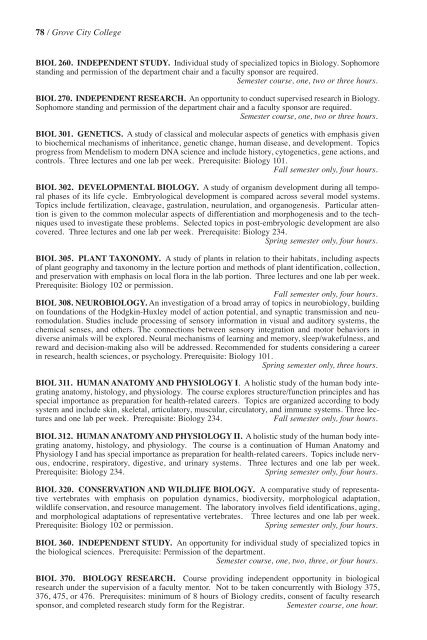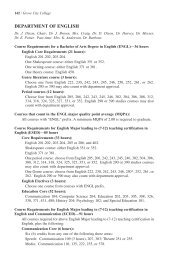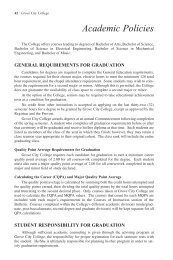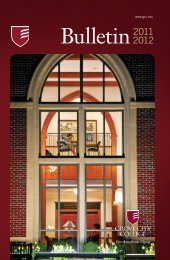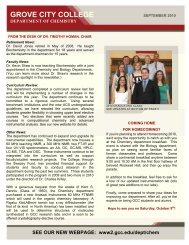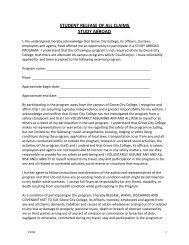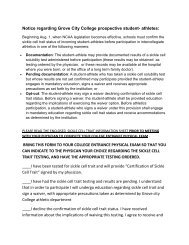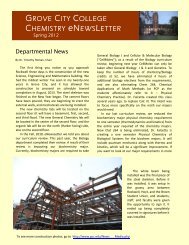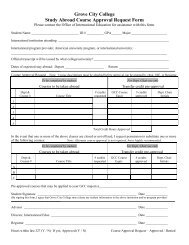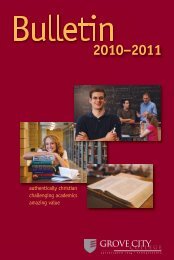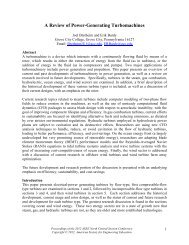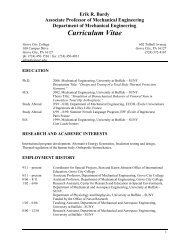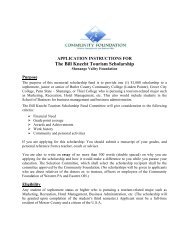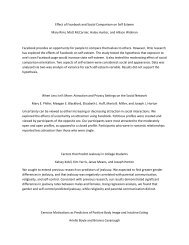2009–2010 - Grove City College
2009–2010 - Grove City College
2009–2010 - Grove City College
Create successful ePaper yourself
Turn your PDF publications into a flip-book with our unique Google optimized e-Paper software.
78 / <strong>Grove</strong> <strong>City</strong> <strong>College</strong><br />
BIOL 260. INDEPENDENT STUDY. Individual study of specialized topics in Biology. Sophomore<br />
standing and permission of the department chair and a faculty sponsor are required.<br />
Semester course, one, two or three hours.<br />
BIOL 270. INDEPENDENT RESEARCH. An opportunity to conduct supervised research in Biology.<br />
Sophomore standing and permission of the department chair and a faculty sponsor are required.<br />
Semester course, one, two or three hours.<br />
BIOL 301. GENETICS. A study of classical and molecular aspects of genetics with emphasis given<br />
to biochemical mechanisms of inheritance, genetic change, human disease, and development. Topics<br />
progress from Mendelism to modern DNA science and include history, cytogenetics, gene actions, and<br />
controls. Three lectures and one lab per week. Prerequisite: Biology 101.<br />
Fall semester only, four hours.<br />
BIOL 302. DEVELOPMENTAL BIOLOGY. A study of organism development during all temporal<br />
phases of its life cycle. Embryological development is compared across several model systems.<br />
Topics include fertilization, cleavage, gastrulation, neurulation, and organogenesis. Particular attention<br />
is given to the common molecular aspects of differentiation and morphogenesis and to the techniques<br />
used to investigate these problems. Selected topics in post-embryologic development are also<br />
covered. Three lectures and one lab per week. Prerequisite: Biology 234.<br />
Spring semester only, four hours.<br />
BIOL 305. PLANT TAXONOMY. A study of plants in relation to their habitats, including aspects<br />
of plant geography and taxonomy in the lecture portion and methods of plant identification, collection,<br />
and preservation with emphasis on local flora in the lab portion. Three lectures and one lab per week.<br />
Prerequisite: Biology 102 or permission.<br />
Fall semester only, four hours.<br />
BIOL 308. NEUROBIOLOGY. An investigation of a broad array of topics in neurobiology, building<br />
on foundations of the Hodgkin-Huxley model of action potential, and synaptic transmission and neuromodulation.<br />
Studies include processing of sensory information in visual and auditory systems, the<br />
chemical senses, and others. The connections between sensory integration and motor behaviors in<br />
diverse animals will be explored. Neural mechanisms of learning and memory, sleep/wakefulness, and<br />
reward and decision-making also will be addressed. Recommended for students considering a career<br />
in research, health sciences, or psychology. Prerequisite: Biology 101.<br />
Spring semester only, three hours.<br />
BIOL 311. HUMAN ANATOMY AND PHYSIOLOGY I. A holistic study of the human body integrating<br />
anatomy, histology, and physiology. The course explores structure/function principles and has<br />
special importance as preparation for health-related careers. Topics are organized according to body<br />
system and include skin, skeletal, articulatory, muscular, circulatory, and immune systems. Three lectures<br />
and one lab per week. Prerequisite: Biology 234. Fall semester only, four hours.<br />
BIOL 312. HUMAN ANATOMY AND PHYSIOLOGY II. A holistic study of the human body integrating<br />
anatomy, histology, and physiology. The course is a continuation of Human Anatomy and<br />
Physiology I and has special importance as preparation for health-related careers. Topics include nervous,<br />
endocrine, respiratory, digestive, and urinary systems. Three lectures and one lab per week.<br />
Prerequisite: Biology 234. Spring semester only, four hours.<br />
BIOL 320. CONSERVATION AND WILDLIFE BIOLOGY. A comparative study of representative<br />
vertebrates with emphasis on population dynamics, biodiversity, morphological adaptation,<br />
wildlife conservation, and resource management. The laboratory involves field identifications, aging,<br />
and morphological adaptations of representative vertebrates. Three lectures and one lab per week.<br />
Prerequisite: Biology 102 or permission. Spring semester only, four hours.<br />
BIOL 360. INDEPENDENT STUDY. An opportunity for individual study of specialized topics in<br />
the biological sciences. Prerequisite: Permission of the department.<br />
Semester course, one, two, three, or four hours.<br />
BIOL 370. BIOLOGY RESEARCH. Course providing independent opportunity in biological<br />
research under the supervision of a faculty mentor. Not to be taken concurrently with Biology 375,<br />
376, 475, or 476. Prerequisites: minimum of 8 hours of Biology credits, consent of faculty research<br />
sponsor, and completed research study form for the Registrar. Semester course, one hour.


